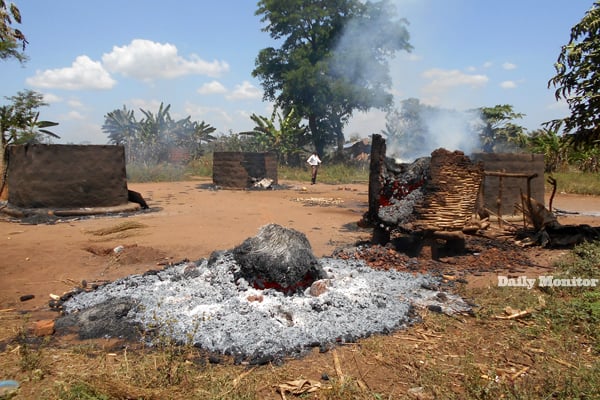Prime
Why clan violence is on the rise in Acholi

Some of the huts which were torched during a land conflict in northern Uganda recently. PHOTO/ FILE
What you need to know:
- Five people have been killed since September this year in such violence.
On September 11, one person died while several houses were torched and women sexually molested in Dika and Onekgwok villages in Onyona Parish, Ongako Sub-county in Omoro District.
This followed a land dispute between the members of two clans; Pukweje and Pukumu.
On November 8, the Uganda Association of Women Lawyers (FIDA) wrote to the UPDF 4th Division commander, Brig Bonny Bamwiseki, calling for the army’s intervention in restoring normalcy and order in the area due to continued conflicts between the two clans.
The dispute is among many other land conflicts that have become rampant in Acholi in the past three years. Authorities are concerned that if they remain unsolved, more people could lose their lives and development could also be delayed.
For example, in mid-October, three people lost their lives while several others sustained injuries in Kitgum-matidi Sub-county, Kitgum District, following a violent clash in the villages of Lumule and Ibakara over a disputed chunk of land.
In the same month, police in Amuru District said one person died in Guruguru, Lamogi Sub-county, when five families fought among themselves over ownership of a three-acre piece of land.
This brings to five the number of people killed across Acholi Sub-region between September and November over land conflicts.
Past incidents
In November 2020, police in Kitgum District arrested 10 people for allegedly participating in an inter-clan clash in Labongo Akwang Sub-county over land. Earlier in May last year, a land dispute among clan members in Labanyango Village, Padibe East Sub-county in Lamwo District left five people severely injured and at least 250 grass thatched huts destroyed.
Police admit that the rising land conflicts need a solution.
“The land cases that we are handling are currently too many although we are also doing a lot of sensitisation and awareness to bring them down,” Mr David Ongom Mudong, the Aswa regional police spokesperson, says.
He attributes the conflicts to illegal land buying and selling, and unclear mode of sharing the land that is communally owned, among others.
“According to our analysis, most of these wrangles are due to failure by families and clans to agree on land sharing, specifically for communal land,” Mr Ongom says.
Fraudulent dealings
“There are so many cases where someone sells the same piece of land to several buyers or does it without the consent of the family or maliciously sells land belonging to another family or clan, thereby sparking fights,” he adds.
In several parts of the region, development efforts are being threatened by the land disputes.
Recently Gulu Catholic Archbishop John Baptist Odama together with Acholi Muslim District Khadi Sheikh Musa Khelil under Acholi Religious Leaders Peace Initiative embarked on mediating several land cases in Kitgum, Gulu and Omoro districts.
Archbishop Odama says greed to own a large chunk of land and desire to sell land for the quick accumulation of assets such as motorcycles, especially among the youth, is escalating land conflicts in the sub-region.
In October, the Acholi Paramount Chief David Onen Acana II told the Local Government minister Raphael Magyezi that the cultural institution was in the process of formulating by-laws and ordinances to curb unnecessary sales and wrangles over land.
Rampant sale of land
He argued that the rampant sale and lease of land had resulted in widespread wrangles, with several fatalities recorded. In 2015, the Ministry of Lands, Housing and Urban Development rolled out registration of customary land in the country, starting from Kasese District.
But many people, including those in northern Uganda, have not fully embraced the exercise.
Mr Tito Brilliant Okello, the chairperson of Pajule Town Council in Pader District, says the land registration exercise in his area was for some time sabotaged by politicians.
“Politics frustrated the intervention. People thought this initiative was a way of grabbing their land and it took us a lot of time to change their minds and get them to embrace it again,” Mr Okello said.
RECENT CASES
September 11: One person died while several buildings were torched and women and young girls sexually molested in Dika and Onekgwok villages in Ongako Sub-county, Omoro District, following a land dispute.
November 2020: Police in Kitgum District arrested 10 people for allegedly participating in an inter-clan clash in Labongo Akwang Sub-county over land. During the operation, police recovered at least 40 head of cattle, 20 sheep, 15 goats and unspecified bags of food items.
May 2020: A land dispute among clan members in Labanyango Village, Padibe East Sub-county in Lamwo District left five people severely injured.




